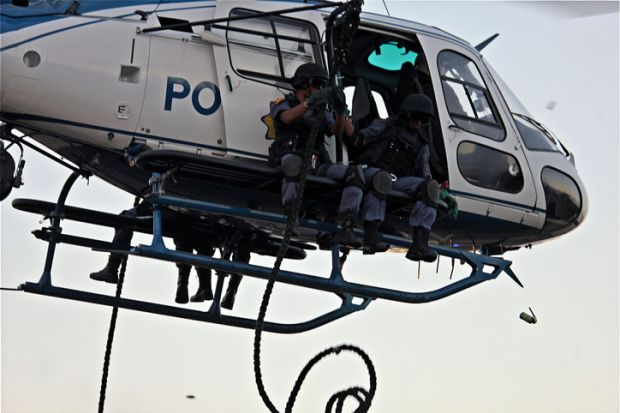Concern about corruption in South African higher education has mounted in the aftermath of the murder of a senior scholar who tried to blow the whistle on academic fraud.
Gregory Kamwendo, dean of arts at the University of Zululand, was shot and killed outside his home in May. Two men appeared in court earlier this month charged with his murder and one, Solly Nkuna, was an academic and former colleague of Professor Kamwendo.
One line of investigation is believed to be that Professor Kamwendo may have been targeted after he uncovered how PhDs were being fraudulently awarded at Zululand, an 18,000-student institution on South Africa’s eastern coast.
Belinda Bozzoli, South Africa’s shadow higher education minister, told Times Higher Education that the killing of Professor Kamwendo was the latest twist in an “ongoing saga” of problems at Zululand. Academic corruption in South Africa had got to a “particularly bad point if people are prepared to kill for it”, said Professor Bozzoli, former deputy vice-chancellor of the University of the Witwatersrand.
In a statement, Zululand condemned “speculations” over the murder. However, it added that managers – including Professor Kamwendo – had discovered “procedural and quality shortcomings” among presented dissertations and theses, which had resulted in disciplinary procedures against supervisors and academic staff at the institution.
Professor Kamwendo was also one of a number of managers who “bore the brunt” of criticism over a drive to root out employees with fraudulent qualifications, according to the university.
“Unfortunately it has become a norm that when the perpetrators, who have connections in higher places, are disciplined by management, the blame is shifted to management and [they are] accused of maladministration practices and victimisation of staff,” the statement said. “It is these disruptive tendencies that continue to undermine the management of Unizulu internally and nationally.
“It is the view of the university that Professor Kamwendo could have been a victim of this continuation of undermining the leadership through mafia tendencies, hence his tragic assassination.”
Zululand is not the only South African institution under scrutiny: in November, the South Africa Human Rights Commission concluded that there were “systematic, institutional challenges” at the University of South Africa related to bullying, favouritism in appointments and harassment. In December, allegations of degree fraud surfaced at Zululand’s neighbouring institution, the University of KwaZulu-Natal.
Naledi Pandor, South Africa’s higher education minister, said it was “clear that there are criminals outside and within our university system who will stop at nothing to use our universities for financial gain”.
Arguing that universities “should be battlefields of ideas, not battlefields of corruption”, Ms Pandor described the threats to academics as a “grave concern”.
However, Professor Bozzoli said she believed that corruption in South African higher education was “much more varied and widespread than we like to think”, and called for radical action.
“The remedy is that some of these universities will need to be closed and reopened as new institutions. It’s very likely that corruption and the ‘patronage politics’ are so well established there that it is going to be difficult to fix those universities without starting again,” Professor Bozzoli said. “Those universities should be focused on teaching and need to be reformed to reflect that.”
Register to continue
Why register?
- Registration is free and only takes a moment
- Once registered, you can read 3 articles a month
- Sign up for our newsletter
Subscribe
Or subscribe for unlimited access to:
- Unlimited access to news, views, insights & reviews
- Digital editions
- Digital access to THE’s university and college rankings analysis
Already registered or a current subscriber? Login








